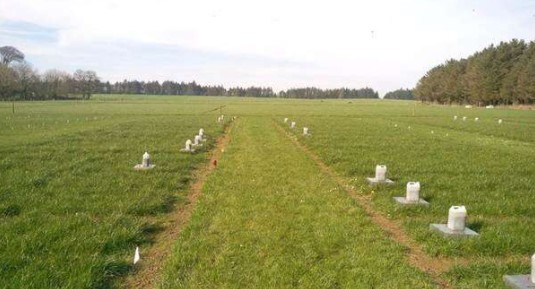
Experimental plots with greenhouse gas measurement chambers in Teagasc Johnstown Castle Research Centre.
A new scientific paper from Teagasc has shown that getting soil pH right through a liming program can significantly reduce emissions of nitrous oxide (N2O), a potent greenhouse gas. The paper from researchers at the Teagasc Environment, Soils and Land-Use Department in Johnstown Castle, County Wexford has just been published in the scientific journal Agriculture, Ecosystems and Environment (AGEE). It concludes that increasing soil pH reduces fertilizer derived N2O emissions in intensively managed temperate grassland.
Head of the Teagasc Environment Research Department, Dr. Karl Richards said: "The paper shows that there are reduced N2O emissions from fertilizer applied to higher pH soils, where the pH is in the recommended agronomic range. Farmers that can improve soil pH for agronomic benefits, can also reduce N2O emissions. This represents a win-win for the farmer and the environment."
Soil pH is generally considered a master variable, controlling a wide range of physical, chemical and biological properties, including a significant effect on microbial processes responsible for production and consumption of N2O. Senior Research officer at Johnstown Castle, Dr. David Wall stated that "using an existing long-term intensive grassland liming and P trial, this research investigated the effect of longer-term lime and P management and their interaction on N2O emissions and grassland productivity.
Click here to see more...